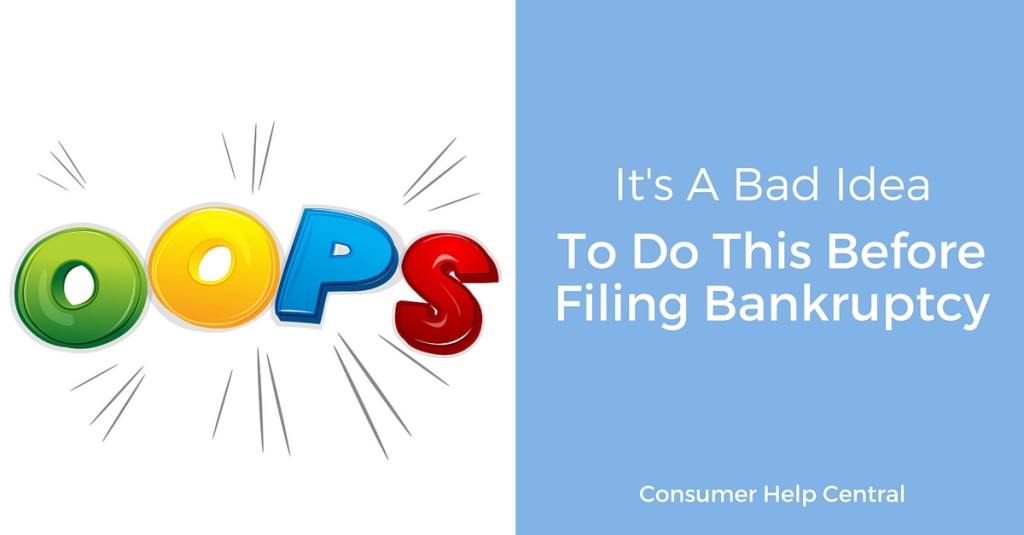Want to make your bankruptcy case smooth, of would you prefer having a tough time of things?
If you’re thinking about bankruptcy, there’s a good chance you’ve never been through the process before.
In fact, most of the people who look into bankruptcy are going through this for the first and only time in their lives.
That’s good and bad. It’s good because it means that most people use their bankruptcy case as the starting point for a new, better financial future.
But it’s bad because more of my clients are walking into unfamiliar territory. With that comes fear, uncertainty and a general unsettled feeling that it’s tough to shake.
In fact, I wish all of my clients had this handy cheat sheet well in advance of them finding me.
- Stop Using Your Credit Cards: Using your credit cards in the run up to filing for bankruptcy can raise questions of possible fraud, which can in turn make for a more difficult court case.
- Stop Taking Money From Your Retirement Plans: We can protect the amount of money you have in your retirement plan from creditors when you file for bankruptcy. If the money’s in your checking or savings account, we can protect only a limited amount of it. And if you’ve paid creditors with the retirement funds, it’s probably gone forever.
- Stop Paying Relatives And Friends: Lots of people borrow money from friends and family members, especially when they’re in debt and trying to juggle multiple financial obligations. But when you file for bankruptcy, any payments made to so-called “insiders” – usually friends and family members may be a problem. If so, the court can order them to pay the money back to the bankruptcy trustee, who will then reallocate the funds among all of your creditors.
- Stop Taking Money From Others For Living Expenses: If you get money from friends and family members on a regular basis, those funds may be considered by the bankruptcy court as part of your income. If so, that may impact your ability to wipe out your debts or cause you to go into a repayment-type bankruptcy case.
- Stop Selling Your Belongings: When you file for bankruptcy, you can often protect most of your belongings within certain limits. If you sell your stuff for less than it’s worth, the bankruptcy court may consider it fraud. That’s bad for your case, as well as for the person to whom you sell the items.
- Stop Using The Same Bank Account (Maybe): If you owe money to your bank – whether for overdraft protection, a line of credit, a credit card, car loan or a personal loan – then you file for bankruptcy, the bank can take whatever money is in your account. That’s called a, “right of setoff,” and it can lead to the immediate loss of your money the minute the case is filed.
- Stop Working That Second Job: The type of bankruptcy case you’re eligible to file is impacted by your average income over the past six months. If you’re working a second (or third) job – or doing anything that temporarily raises your income – then the court will look at it as if you’re making more money. Best to stick to your regular job so the numbers reflect your financial reality.
- Stop Trying To Settle Your Debts: Debt settlement works really well if you’ve got only 1 or 2 creditors. But if you owe money to more than a few creditors, chances are pretty good that you won’t be able to settle all of the accounts on favorable terms. Settling only a few of them means that the others may end up suing you for collections anyway, forcing you into bankruptcy. Why throw away money if it’s not going to help you, right?
- Stop Listening To Your Friends And Family Members: Your loved ones have your best interests at heart. They don’t want you to file for bankruptcy because they think it’s the end of your financial world. They think you’ll never get credit, a mortgage or a car loan ever again. But as much as they love you, they may not have the most complete and accurate information available about bankruptcy. You’d be better off sitting down with someone who understands bankruptcy and has white knowledge in the field.
- Stop Worrying About The Future Before Handling The Past: You’re probably worried about qualifying for a mortgage in the future. But if you look around you, you’ll notice that you probably don’t have money for a downpayment now. You probably don’t have good credit at the moment. In fact, there’s probably a very slim chance that you’d qualify for a mortgage right now – or ever, if you don’t get rid of your debts. Once you deal with your debts, you’ll be able to not only save money but work on tactics that will help you raise your credit score more quickly.
The entire decision-making process that goes into filing for bankruptcy is complicated. Much of it seems silly at best, irrational at worst. That’s why you want to sit down with a seasoned professional as quickly as possible once you know you’re in over your head.
